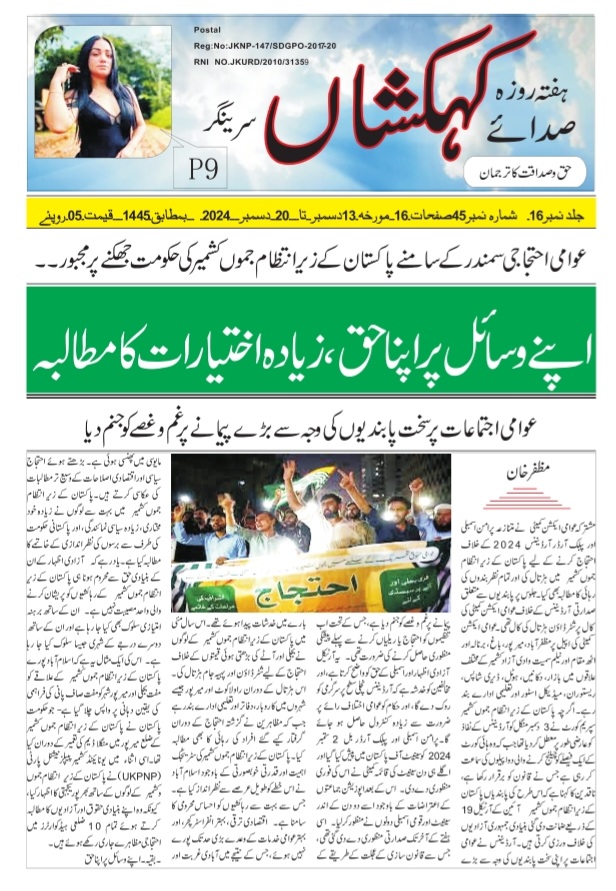Muzaffar Khan.
The Joint Public Action Committee has called for a strike in Pakistan-administered Jammu and Kashmir to protest against the controversial Peaceful Assembly and Public Order Ordinance 2024 and also demanded the release of all detainees.
The shutter-down strike is being called on the call of the Public Action Committee against the Presidential Ordinance regarding restrictions on processions.
On the appeal of the Public Action Committee, markets, shops, hotels, dairy shops, restaurants, medical stores and educational institutions are closed in various areas of Azad Kashmir Valley including Muzaffarabad, Mirpur, Bagh, Barnala and Ath Muqam and Neelum.
Although the Supreme Court of Pakistan-administered Jammu and Kashmir temporarily suspended the implementation of the ordinance on Tuesday, December 3, while it hears two appeals challenging a high court ruling that upheld the law, critics say such restrictions violate fundamental democratic freedoms guaranteed by Article 19 of the Constitution of
Pakistan-administered Jammu and Kashmir.
The ordinance has sparked widespread outrage due to its strict restrictions on public gatherings, which now require organizations to obtain prior approval before holding protests or rallies. The article clarifies the right to freedom of expression and assembly, and opponents fear that the ordinance will stifle grassroots activism, giving authorities undue control over public dissent.
The Peaceful Assembly and Public Order Bill was introduced in the Senate of Pakistan on September 2, 2024, and was quickly approved by the Senate Standing Committee the next day. It was then passed by both the Senate and the National Assembly within two days, despite objections from opposition parties. Presidential assent was given by the end of the same week, raising concerns about the rushed nature of the legislation.In May this year, people in Pakistan-administered Jammu and Kashmir staged a shutter-down and wheel-jam strike to protest rising electricity and flour prices. Businesses, offices, and educational institutions remained closed in cities like Rawalakot and Mirpur during the strike, while protesters also demanded the release of those arrested during previous protests. Despite Pakistan-administered Jammu and Kashmir’s strategic importance and natural beauty, Islamabad has long neglected the region leaving many residents feeling deprived. Promises of economic growth, better infrastructure, and better public services have largely gone unfulfilled, leaving the population mired in poverty and despair.
The growing protests reflect broader demands for political and economic reform. Many people in Pakistan-administered Jammu and Kashmir have demanded greater autonomy, greater political representation and an end to years of neglect by the Pakistani government. The deprivation of their fundamental right to freedom of expression is not the only affliction plaguing the residents of Pakistan-administered Jammu and Kashmir. They are also being blatantly discriminated against and treated like second-class citizens. One example is that Islamabad has gone back on its assurance of providing free electricity to the entire Pakistan-administered Jammu and Kashmir region and free clean water to the city of Mirpur – which the Pakistani government had made during the construction of the Mangla Dam in Mirpur district of Pakistan-administered Jammu and Kashmir.
Meanwhile, the United Kashmir People’s National Party (UKPNP) expressed strong solidarity with the people of Pakistan-administered Jammu and Kashmir, as they continue to hold protests in all 10 district headquarters demanding their fundamental rights and freedoms. The protests, which reflect deep frustration with decades of oppression, highlight the ongoing struggle of the people of the region, which has been under Pakistani control since 1947.
In a statement, UKPNP Foreign Affairs Committee President Jamil Maqsood stressed the historical injustices faced by the people of Pakistan-administered Jammu and Kashmir, who have endured systematic denial of political, economic and social rights for 77 years. Maqsood criticised successive Pakistani governments for treating the region not as a sovereign entity but as a colony which is vulnerable to exploitation. He cited the plunder of natural resources, the imposition of unelected officials in local governance and the suppression of dissent as examples of the ongoing abuses of the people. UKUNP has condemned the situation in Pakistan-administered Jammu and Kashmir, where fundamental freedoms such as freedom of expression, assembly and the press are severely restricted. It has been observed that activists, intellectuals and ordinary citizens who allegedly raise their voices against injustices face harassment, arbitrary arrests and enforced disappearances. The Government of Pakistan should take steps to protect public rights in Pakistan-administered Jammu
After days of unrest, the
Pakistan-administered Jammu and
Kashmir government on Sunday withdrew a controversial presidential ordinance that required prior government permission for public protests.
Sensing growing public discontent amid shutter-down strikes and massive demonstrations,President Barrister Sultan Mahmood announced the withdrawal of the ordinance and government officials held formal talks that resulted in a written agreement.
The people who came out to protest deserve congratulations and the people gave a befitting reply to the government and bureaucrats. The people proved that Pakistan-administered Jammu and Kashmir has its own law and order. This proved that the government is forced to bow before the ocean of people.



